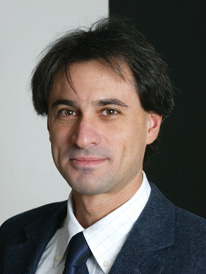Professor Dario Floreano
Professor Dario Floreano, Ph.D. is directory of the EPFL, Laboratory of Intelligent Systems. His laboratory focuses on the development of intelligent robotics and software inspired by biological principles of self-organization. There are three main directions:
Bio-mimetic micro-flying robots
His laboratory has developed a series of vision-based robots, with
weights between
1.5 and 30 grams, capable of flying indoor with minimal human
intervention. Research efforts focus on shape, aerodynamics,
mechatronics, vision processing, and control of such machines.
Biological inspiration in control and vision processing allowed them to
break several world records in miniaturized autonomous flyers. Such
robots include both wing and rotor based systems. They operate either
as individual units or in swarm formation. Outdoor small flying robots
(less than 300g) are being developed that won’t need GPS or classic
autopilot systems for autonomous navigation.
Evolutionary Software and Hardware
His lab developed several novel approaches to artificial evolution of
complex embedded systems characterized by non-linear interactions of
multiple hardware and software components. The application to robotics,
known as Evolutionary Robotics, is a classic specialty of the
laboratory. Current research efforts aim at evolutionary synthesis of
analog electrical circuits, modular neural controllers, reverse
engineering of biological networks (genetic and metabolic networks),
and analysis of physiological variables for fatigue reduction.
Collective and Swarm Systems
In collaboration with evolutionary and behavioral biologists, he has
synthesized methods for control of systems composed of multiple agents
and processes that can display altruistic cooperation, division of
labor, and communication. These methods are applied and developed in
teams of robots (wheeled and flying) as well as to the investigation of
biological theories of emergence of cooperation in insect societies.
Current efforts are aimed at development of novel hardware and control
methods that can profit from such developments, such as multiple and
expendable robots for search and rescue, monitoring, and exploration of
areas dangerous for humans.
Dario earned an M.A. in visual psychophysics at the University of Trieste in 1988, an M.Sc. in Neural Computation from the University of Stirling in 1992, and a Ph.D. in Cognitive Systems and Robotics from University of Trieste in 1995. He was research fellow at the National Research Council in Roma, at the Department of Computer Science and Mathematics of the University of Stirling, at the Department of Computer Science of EPFL, and at Sony Computer Science Laboratory in Tokyo. In 2000 he was awarded a Swiss NSF professorship to pursue research in bio-inspired robotics at EPFL. In 2005 he was appointed associate EPFL professor and established the Laboratory of Intelligent Systems.
He chaired several international conferences, is cofounder of the Artificial Life Society, Inc., member of the Board of Governors of the International Society for Neural Networks, and is on the editorial board of the following international journals: Neural Networks, Genetic Programming and Evolvable Machines, Adaptive Behavior, Artificial Life, Connection Science, Evolutionary Computation, IEEE Transactions on Evolutionary Computation (IEEE), and Autonomous Robots.
Dario coedited From Animals to Animats 6: Proceedings of the Sixth International Conference on Simulation of Adaptive Behavior (Complex Adaptive Systems), coauthored Evolutionary Robotics: The Biology, Intelligence, and Technology of Self-Organizing Machines (Intelligent Robotics and Autonomous Agents), Bio-mimetic Evolutionary Reverse Engineering of Genetic Regulatory Networks, Active Vision and Neural Development in Animals and Robots, Flying over the Reality Gap: From Simulated to Real Indoor Airships, and Superlinear Physical Performances in a SWARM-BOT. Read the full list of his publications!
Check out his laboratory’s podcast series Talking Robots.
